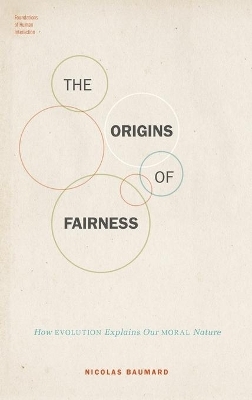
The Origins of Fairness
Oxford University Press Inc (Verlag)
978-0-19-021022-9 (ISBN)
In order to describe the logic of morality, "contractualist " philosophers have studied how individuals behave when they choose to follow their moral intuitions. These individuals, contractualists note, often act as if they have bargained and thus reached an agreement with others about how to distribute the benefits and burdens of mutual cooperation. Using this observation, such philosophers argue that the purpose of morality is to maximize the benefits of human interaction. The resulting "contract " analogy is both insightful and puzzling. On one hand, it captures the pattern of moral intuitions, thus answering questions about human cooperation: why do humans cooperate? Why should the distribution of benefits be proportionate to each person's contribution? Why should the punishment be proportionate to the crime? Why should the rights be proportionate to the duties? On the other hand, the analogy provides a mere as-if explanation for human cooperation, saying that cooperation is "as if " people have passed a contract-but since they didn't, why should it be so?
To evolutionary thinkers, the puzzle of the missing contract is immediately reminiscent of the puzzle of the missing "designer " of life-forms, a puzzle that Darwin's theory of natural selection essentially resolved. Evolutionary and contractualist theory originally intersected at the work of philosophers John Rawls and David Gauthier, who argued that moral judgments are based on a sense of fairness that has been naturally selected.
In this book, Nicolas Baumard further explores the theory that morality was originally an adaptation to the biological market of cooperation, an arena in which individuals competed to be selected for cooperative interactions. In this environment, Baumard suggests, the best strategy was to treat others with impartiality and to share the costs and benefits of cooperation in a fair way, so that those who offered less than others were left out of cooperation while those who offered more were exploited by their partners. It is with this evolutionary approach that Baumard ultimately accounts for the specific structure of human morality.
Nicolas Baumard is Research Scholar in the Department of Cognitive Sciences at the Ecole Normale Supérieure in Paris.
INTRODUCTION: Reconciling morality with the natural sciences
Naturalism: The moral sense
Contractualism: The social contract
A naturalistic and contractualist theory of morality
PART 1: THE MORAL SENSE
Chapter 1: A mental organ
1. An autonomous disposition
Moral judgments and moral intuitions
Moral intuitions and moral ideas
2. A domain-specific disposition
Morality, a passion among others
The sense of honor
3. A universal disposition
Variability as a product of the diversity of situations and beliefs
Observed diversity and real diversity
4. An innate disposition
5. Non-intuitive moral judgments
Chapter 2: A functional disposition
1. The competing passions
2. The moral sense and non-naturalistic theories
The domain specificity of moral judgments
The innateness of moral judgments
3. The moral sense as adaptation
Functionality and modularity
Efficient causes and final causes
PART 2: MORALITY AS FAIRNESS
Chapter 3: From cooperation to morality
1. A naturalistic contractualism
2. From the cooperation market to the sense of fairness
The cooperation market
Cooperation market theory vs. other mutualistic theories
Manipulation on the cooperation market
The cooperation market in the ancestral environment
3. The sense of fairness
The example of reciprocity and justice
Moral rectitude, or fairness in general
Fairness and power relationships
Framing effects
Chapter 4: Moral principles and the sense of fairness
1. Getting past principles
2. The mutualistic logic of moral dilemmas
Actions and omissions
The trolley dilemma
A mutualistic analysis of the trolley problem
Utilitarian interpretations of the trolley problem
3. Principles and justice
Chapter 5 A cognitive approach to the moral sense
1. A contract without negotiations: Morality and theory of mind
The importance of others: Mental states vs. interests
Consent has no moral value
A mutualistic approach to responsibility
2. The evaluation of individual interests
Intuitive axiology and the moral sense
Victimless crimes
Roles and statuses
Moral differences between the sexes
3. The limits of the moral community
The proper and actual domains of the moral sense
The variability of the actual domain
4. Disposition and micro-dispositions
PART 3: MORALITY AS SACRIFICE
Chapter 6 Mutualistic morality and utilitarian morality
1. Utilitarian morality and group selection
2. Utilitarian societies?
Observed utilitarianism and real utilitarianism
Collectivism and utilitarianism
Social institutions and moral interactions
3. Utilitarian judgments?
Distributive justice
Retributive justice
Supererogatory actions
Moral dilemmas
4. Economic games
The ecological validity of economic games
Economic games: moral situations
A mutualistic analysis of economic games
Chapter 7: Punishment: useless and uncertain
1. A marginal practice in non-state societies
2. Revenge, ostracism and self-defense: punishments?
3. A simple question of duty
A mutualistic analysis of apparently punitive actions
Punishment in economic games
4. Retributive justice and penal systems
PART 4: MORALITY AS EXCELLENCE
Chapter 8: Mutualistic morality and virtue morality
1. Sympathy
The three faces of Adam Smith
Of sympathy and the other social sentiments
2. The parental instinct
3. Disgust
4. The virtues
Chapter 9: On the "state of nature"
1. Morality in animals
Morality: one disposition among many
Primate morality: reality or anthropomorphism?
2. Morality and social cognition
Understanding others to communicate
Communicating to cooperate
CONCLUSION
1. The steps in the argument
2. The scientific implications of a mutualistic theory
3. The practical implications of mutualistic theory
References
| Erscheinungsdatum | 12.03.2016 |
|---|---|
| Reihe/Serie | Foundations of Human Interaction |
| Verlagsort | New York |
| Sprache | englisch |
| Maße | 157 x 236 mm |
| Gewicht | 499 g |
| Themenwelt | Geisteswissenschaften ► Philosophie ► Ethik |
| Geisteswissenschaften ► Psychologie | |
| Naturwissenschaften ► Biologie ► Evolution | |
| Sozialwissenschaften ► Soziologie | |
| ISBN-10 | 0-19-021022-2 / 0190210222 |
| ISBN-13 | 978-0-19-021022-9 / 9780190210229 |
| Zustand | Neuware |
| Haben Sie eine Frage zum Produkt? |
aus dem Bereich


